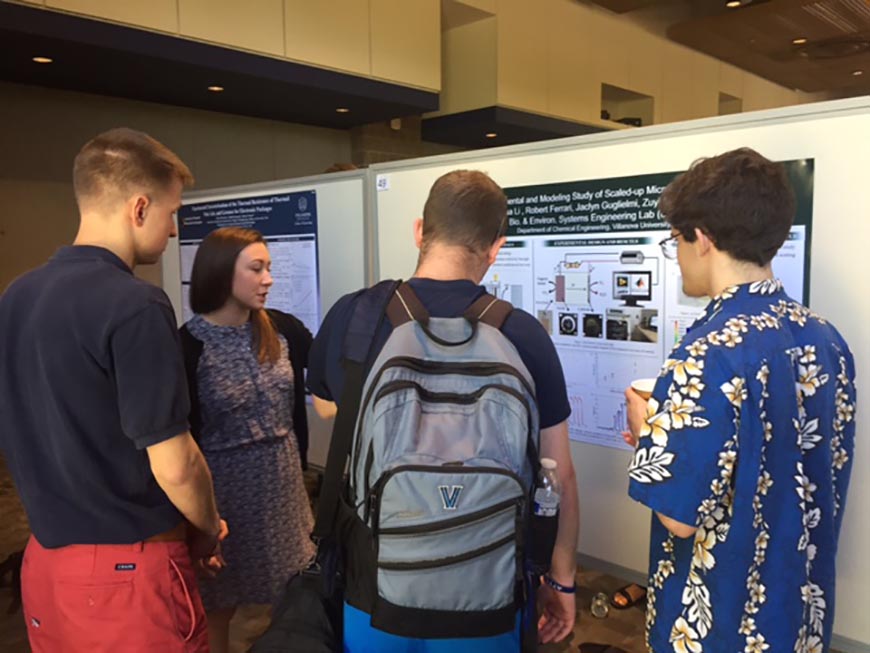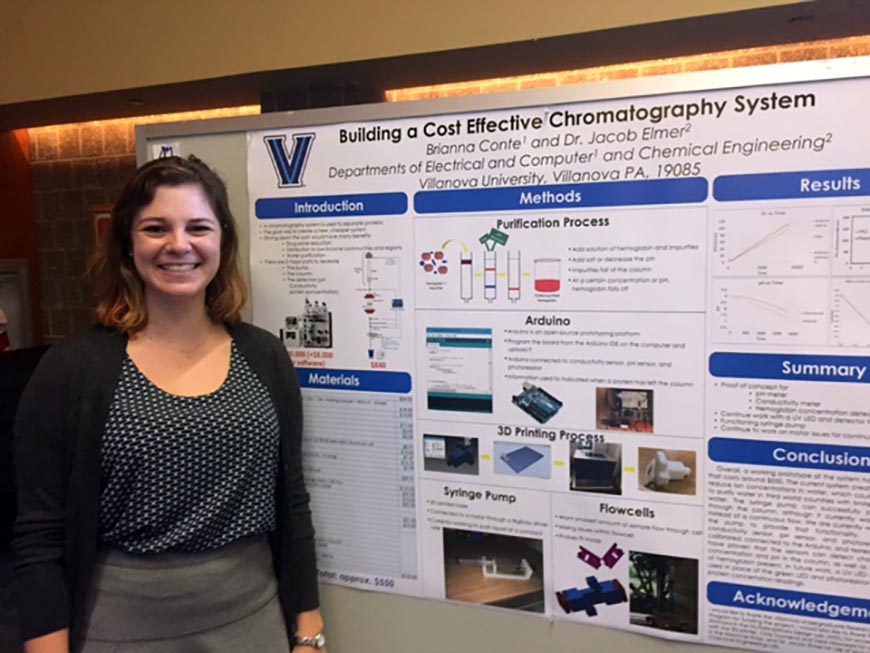Engineering Students Present at Sigma Xi Student Research Poster Symposium
Fourteen Engineering undergraduates and 14 Engineering graduate students took part in Villanova University’s 2017 Sigma Xi Student Research Poster Symposium. The international honor society for research scientists and engineers, Sigma Xi hosts this annual event to foster, recognize and celebrate the next generation of researchers in fields including Astronomy and Astrophysics, Biochemistry, Chemistry, Biology, Computer Science, Physics, Math, Psychology and Engineering.

Jaclyn Guglielmi ’17 ChE presents her team’s work, which placed first among Engineering undergraduate posters.
Judges evaluated the research posters and provided written feedback to the presenters. The day’s events concluded with awards being presented for outstanding posters. Within the College of Engineering, Chemical Engineering seniors Robert Ferrari and Jaclyn Guglielmi and graduate student Xianhua Li took the first place undergraduate award for their “Microbial Fuel Cell (MFC) Scaling Up Study.” Advised by Assistant Professor of Chemical Engineering Zuyi Huang, PhD, the team’s research focused on the high demand for cost-effective methods for converting the chemical energy in wastewater into bioenergy. MFCs are capable of producing electricity from wastewater under ambient conditions through the biodegradation of organic compounds by exoelectrogenic microorganisms. One of the biggest challenges for the practical implementation of MFCs in wastewater treatment plants, however, is to successfully scale up MFCs. This study investigated the performance and scalability of MFCs through a combined experimental and computational approach.

Brianne Conte ’18 EE took second place for her undergraduate engineering poster.
Taking second place in the engineering undergraduate category was Electrical Engineering junior Brianne Conte, who was mentored by Assistant Professor of Chemical Engineering Jacob Elmer, PhD. Brianne used innovative technologies to create an affordable chromatography system that provides equally high purity and functionality compared to a commercial system. (A chromatography system is used to separate the components of a mixture for later use, and is thus a form of purification). A commercial system can cost approximately $44,000, while Brianne’s working prototype was completed for about $550.
The first place graduate student award went to Tao Dai for “Environmental Impact of an Industrial Kitchen: A Case Study.” Mentored by Mechanical Engineering Department Chair and Professor Amy Fleischer, PhD, and Associate Professor and Director of Graduate Studies Aaron Wemhoff, PhD, Tao conducted a gate-to-grave life cycle assessment of 11 types of food to evaluate the environmental impact of a typical industrial kitchen.
Finally, Dieter Bender, a Mechanical Engineering graduate student, took second place for “Improving Cardiopulmonary Resuscitation (CPR) Outcomes Using Model Based Optimization.” His mentor was Professor and Villanova Center for Analytics of Dynamic Systems Director C. Nataraj, PhD. Dieter’s study proposed a novel approach for gaining a broader understanding of CPR physiology and the elemental principles underlying its outcomes.
